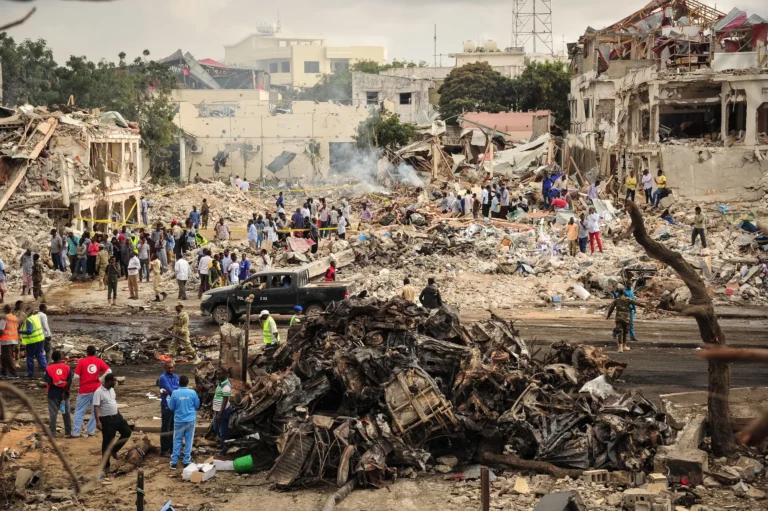MOGADISHU, Somalia – Eight years after a truck bomb tore through one of Mogadishu’s busiest intersections, Somalis across the country and the diaspora paused on October 14 to remember the lives lost in the deadliest terrorist attack in Somalia’s history.
The 2017 bombing at Zoobe junction killed more than 600 people and injured nearly 1,000 others. The scale of the destruction left families shattered, and many victims remain unidentified to this day.
For Asha Ali, the grief is still fresh.
“That day changed everything,” she said. “Six of my loved ones were gone in an instant. We never even found all their bodies. We still mourn every day.”
Ali is not alone. Across Mogadishu, families gathered near the site of the blast—now a memorial—to lay flowers and pray. Others took to social media, sharing photographs and memories of those lost.
‘The Blast That Broke the City’
Witnesses recall the moment of the explosion as a wave of fire, glass, and debris that ripped through buildings and vehicles.
Feisal Hussein, who lost four relatives and five close friends, said he still hears the sound of the blast in his sleep.
“I wasn’t far. It was the loudest thing I’ve ever heard,” he said. “I live with the images in my head—burned cars, bodies, people screaming. It’s like a nightmare that never ends.”
The attack was later blamed on al-Shabaab, the al-Qaeda-linked armed group that has been waging an insurgency in Somalia for more than a decade. Although the group never formally claimed responsibility for the Zoobe bombing, Somali authorities maintain it was their work.
A Nation Still Healing
Each year, the anniversary is marked with both sorrow and calls for unity. This year’s remembrance comes as Somalia steps up military operations against al-Shabaab in regions like Hiran, with support from local militias and international partners.
Speaking at the commemoration, Mohamud Moalim, head of Somalia’s disaster management agency, called for renewed resolve.
“We must never forget the pain of October 14. But this pain must fuel our determination to defeat terrorism and protect our people.”
“The feeling is not just one of grief,” he added. “It’s also resistance. This anniversary is a symbol of Somali resilience.”
Fighting an Enduring Threat
Since 2007, al-Shabaab has launched countless attacks on civilians, government institutions, and international forces. According to UN data, more than 1,200 civilians were killed in terrorist attacks in Somalia in just two years between 2018 and 2019.
Despite territorial gains by government forces, the group remains capable of striking at the heart of the capital, as seen in recent attacks on hotels and government buildings.
Security analysts say the Zoobe bombing was a turning point in public perception of the group.
“That attack changed how Somalis see al-Shabaab. People saw them for what they really are—enemies of the Somali people,” said political analyst Hodan Ahmed.
A Graveyard Without Names
For many families, the greatest pain is not only the loss—but the lack of closure.
“We buried empty coffins,” said Hassan Yare, whose brother was among the victims. “We never got his body. We still talk about him like he might walk through the door.”
At the Zoobe junction, a new memorial structure is under construction—a small tribute in a place where hundreds died without names etched in stone.
“They tried to break us,” said survivor Muna Jama. “But we are still here. And we remember.”
